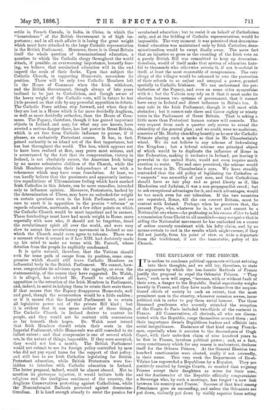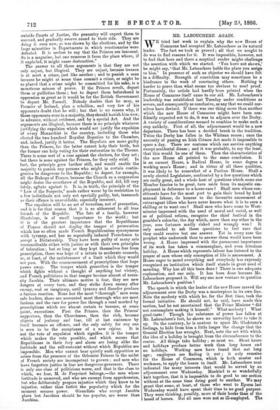THE EXPULSION OF THE PRINCES.
IT is useless to condemn political opponents without entering into their thoughts, and we will try, therefore, to state the arguments by which the less fanatic Radicals of France justify the proposal to expel the Orleanist Princes. "They have," such men will argue, "become, with or without fault of their own, a danger to the Republic. Social superiority weighs heavily in France, and they have made themselves the unques- tioned chiefs of society to such an extent, that the most prominent men in the country, whenever occasion serves, incur political risk in order to pay them social honour. The three thousand gentlemen who recently attended the reception of the Comte de Paris included two-thirds of the eminent in France. All Conservatives, all clericals, all who are discon- tented with the Republic, range themselves around them ; and their importance dwarfs Republican leaders and officials into social insignificance. Eminence of that kind among French- men, especially when it accretes to the descendants of Hugh Capet, with their unbroken claim of nine hundred years to be first in France, involves political power ; and, as a fact, every constituency which for any reason is malcontent, declares itself for the Orleans Princes. At the General Election two hundred reactionaries were elected, really if not avowedly, in their name. This very week the Department of Ile-et- Vilaine has superseded a Republican by a Royalist. They are positively courted by foreign Courts, so courted that reigning Princes accept their daughters as wives for their eons, and the Ambassador of the Republic officially congratulates a Sovereign who, by such a marriage, has forged a new lir* between his country and France.' Success of that kind among Frenchmen goes on succeeding, and unless the Orleanists are put down, violently put down by visibly superior force acting
outside Courts of Justice, the peasantry will expect them to succeed, and gradually swerve round to their side. They are doing it even now, as was shown by the elections, and by the large minorities in Departments in which reactionaries were defeated. It is useless to say that the Princes are innocent. So is a magazine, but one removes it from the place where, if it exploded, it might cause destruction." The answer to all those arguments is that they are not only unjust, but illogical. They are unjust, because treason is at most a crime, just like another ; and to punish a man because he might at some time commit a crime, or might be so placed that a crime might be committed for his sake, is a monstrous misuse of power. If the Princes revolt, deport them or guillotine them ; but to deport them beforehand is oppression as great as it would be for the British Government to deport Mr. Parnell. Nobody doubts that he may, as Premier of Ireland, plan a rebellion, and very few of his opponents doubt that he will ; but that is no reason why, if those opponents were in a majority, theyshould banish him now, in advance, without evidence, and by a special Act. And the arguments are illogical, because there is no principle whatever justifying the expulsion which would not justify the expulsion of every Monarchist in the country, including those who elected the two hundred Royalist Deputies to the Chamber, and, indeed, justify it better. The Royalists are more guilty than the Princes, for the latter cannot help their birth, but the former can help voting for their restoration to the Throne. There is some sort of a case against the electors, for they act ; but there is none against the Princes, for they only exist. In fact, the principle goes further still, and would enable the majority to punish any persons who might in certain contin- gencies be dangerous to the Republic ; to deport, for example, all the Bishops of France, because the Church as a corporation might desire the overthrow of the Republic, and did, till very lately, agitate against it. It is, in truth, the principle of the "Law of the Suspects," made rather worse by its restriction to a few individuals not only not specially guilty, but, inasmuch as their offence is unavoidable, especially innocent.
The expulsion will be an act of terrorism, not of precaution, and it is for that reason that it is so abhorrent to all true friends of the Republic. The fate of a family, however illustrious, is of small importance to the world ; but it is of the greatest importance that the Republicans of France should not display the temper of persecution which has so often made French Republicanism synonymous with tyranny, and has so repeatedly induced Frenchmen to accept a Dictatorship. They have been guilty of many acts irreconcileable either with justice or with their own principles of toleration ; but so long as they kept themselves free from proscription, there was hope of a return to moderate counsels, or, at least, of the maintenance of a limit which they would not pass. With the commencement of proscriptions that hope passes away. The temper which proscribes is the temper which fights without a thought of anything but victory, and French politicians in that temper become almost of neces- sity Jacobin. Their ultimate motive is fear, they see new dangers at every turn, and they strike down enemy after enemy, real or imaginary, until tyranny and disorder produce a furious reaction. None but the most " thorough " men seem safe leaders, those are accounted most thorough who are most furious, and the race for power lies through a road marked by proscriptions which are almost certain to become, at some point, executions. First the Princes, then the Princes' supporters, then the Churchmen, then the rich, become objects of jealousy and fear, till at last eminence by itself becomes an offence, and the only safety for any one is seen to be the acceptance of a new regime. It is not the vote of expulsion which signifies, it is the temper which makes the vote possible, and which means that Republicans in their fury and alarm are losing alike the fortitude and the self-restraint without which Republics are impossible. Men who cannot bear quietly such opposition as arises from the presence of the Orleanist Princes in the midst of French society are incompetent to govern ; and men who have forgotten justice in fear are dangerous governors. There is only one class of politicians worse, and that is the class to which, we fear, M. de Freycinet belongs,—the men whose fortitude is unmoved, and who are exempt from apprehension, but who deliberately propose injustice which they know to be injustice, rather than forfeit the popularity which for the
moment secures power. Girondists who accept Jacobin plans lest Jacobins should be too popular, are worse than Jacobins.



































 Previous page
Previous page